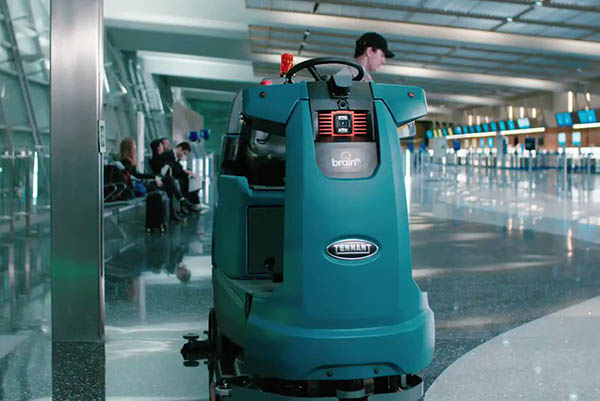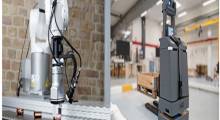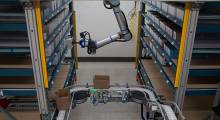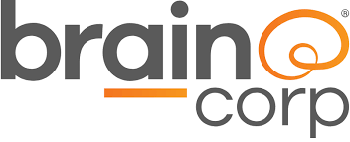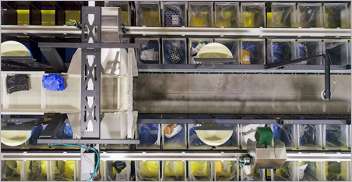Software is increasingly the differentiator and enabler of fleets of mobile robots. Brain Corp. has announced the appointment of Michel Spruijt as chief revenue officer. He will lead the company's global commercial strategy, sales, business development, and customer success teams.
“Michel has proven himself to be an exceptional leader, building a high-performing European team which has delivered significant growth across the continent,” stated David Pinn, who was recently named CEO of Brain Corp. “We’re very excited to have him take an even more expansive role in driving the company's growth by focusing on revenue generation and global expansion.”
The San Diego-based company's BrainOS software uses artificial intelligence and the cloud to manage fleets of robots in commercial public spaces for applications including floor cleaning and taking inventory.
Robotics 24/7 spoke with Spruijt about his management experience, scaling Brain Corp for existing and emerging markets, and how to build a strong internal team.
You were previously vice president and general manager for Europe and senior vice president of international business at Brain Corp. How does that and your other experience help you in your new role?
Spruijt: Before Brain Corp, I spent 20 years at Ergotron, a Minneapolis-based manufacturer of monitor-mounting solutions. I went up through the ranks to become general manager of EMEA [Europe, the Middle East, and Africa], supervising 60 people.

I also worked to make sure that we avoided channel conflicts between distributors and multiple resellers who sell to end users. It's important for the whole channel to stay clean.
Brain needed someone able to work with OEM partners who also has multidisciplinary experience with product management, business development, sales, distribution, site management, customer repair, and tech support. I went from being the only employee in Europe to 10 people.
After my first job, I never inherited someone else's job. I like to take a job and expand and mature each role.
Brain Corp scales for global growth
During your time at Brain Corp, you've helped BrainOS-powered robots cover 500 million sq. ft. (46.54 million sq. m) and the company to achieve 100% year-over-year growth in Europe. Are there differences in how fleets of autonomous mobile robots (AMRs) grow worldwide?
Spruijt: In the U.S., when a company's headquarters decides to do something, it can roll it out across the country. In Europe, it's way more fragmented.
We trialed a sale in one country and then tried to roll it out to another country, but it didn't work. It's not a matter of the company base, but each unit invests in its own way with its own decision cycles.
Also, the rollouts are smaller in Europe, unlike Walmart, which has thousands of stores. In the U.S., deployments spike, but in Europe, they're more gradual. Companies need to invest more time, but the risk is lower.
Another thing we see is that cleaning is done through contractors in Europe, and there are differences between verticals, like logistics and retail.
In general, compared with three years ago, we don't need to explain that robots aren't competing with people for jobs. You can keep on running from it until it bites you, or you can embrace automation and find where it can help you.
Shortages of labor are a universal problem. They were already there before the pandemic, but not so visible. A lot of people who worked in cleaning and restaurants have moved on to other jobs and aren't coming back. There are also early retirements, and a lot of kids decided to stay in school longer to make up for missed opportunities. In Europe, the workforce is estimated to diminish by 13%.
The smart companies will look at the right combination of people and robots to make things easier. It's not just cleaning, but also, “How can we use our people better and have a safer, cleaner environment?”
As you scale up Brain deployments, are you looking for new partners and markets?
Spruijt: We have a pretty good set of OEMs today. We're not actively searching for new partners, but I never thought three years ago that we'd do shelf scanning at Sam's Club. We're really focused on working with equipment manufacturers and retailer customers to solve their problems, doing daily tasks like cleaning and inventory with tools and data.
Our target markets are North America and Europe, where there are customers with bigger stores. For me, emerging markets include countries like Brazil, Mexico, Singapore, Japan, Australia, and New Zealand, which all have big retail chains. In Italy, the government offers stimulus for robotics, so that can also be a driver.
At the end of the day, we don't tell our OEMs where to sell, and there are markets that are more interesting for BrainOS-powered robots. Putting a robot in a facility is only Step 0.1 of the process—you don't buy a robot; you buy a process. We also want to make sure that when robots enter a region, that customer expectations are part of the process.
How important is localization of support?
Spruijt: It was one of my biggest concerns; we have built it out. We have people covering time zones from Amsterdam to Japan. We hire for language. It's a bit easier in Europe to find good people with multiple languages. Writing e-mails in English is something that everyone can do in Europe, but the challenge can be on the phone.
Everything we log is in one system, so we can see Europe, APAC [Asia-Pacific], and the U.S. People are expecting global support.
It's the same on the business-development side. We want to ensure the right touch is there. OEMs are the first line and always have local expertise.
Collaboration and corporate culture
How long have Brain Corp's new executive appointments been in the works? How closely do you expect to collaborate?
Spruijt: I've had a lot of conversations with David and Eugene [Izhikevich, company founder and executive chairman]. David becoming CEO was in the works for a longer time, but I've been working on bringing myself up in the organization for the past three years.
We're very available to each other, and today, it's easier to connect with WhatsApp, Slack, and unlimited e-mail. We all understand the urgency and common goals. We need to continue our focus on OEMs, automate the aisle, and put customers first.
What are some of your personal and corporate goals as you travel between Amsterdam and San Diego?
Spruijt: Video calls were nice during the pandemic, but I'm a people person. My goal is always to get to know the people I work with. My main travel will be to the San Diego office, and I want to know all 250 people here by name.
Since I'm from Europe, I look at doing things differently. I'll ask a lot of questions. Some people ask, “Why?” but I want to ask “How can we make things better?” I want to understand the bigger picture. If there are struggles on the engineering side, they probably also translate into customer opportunities.
How do you build an attractive corporate culture in a competitive environment?
Spruijt: We need people who wake up every single day excited to do their thing. They should be empowered to make decisions within their own frameworks without having to wait for feedback or approval.
I try to organize multidisciplinary meetings. In Europe, the team has a shared WhatsApp channel so staffers know what's going on, not just about work, but about people. It's not about sending an e-mail but taking the time to listen.
If you hire for passion and drive, people will go the extra mile, as long as you have shared goals and a clear vision. Team spirit is important to Brain Corp.
About the Author
Follow Robotics 24/7 on Linkedin
Article topics
Email Sign Up

